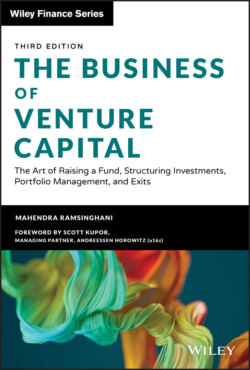Читать книгу The Business of Venture Capital - Mahendra Ramsinghani - Страница 26
ROLES AND RESPONSIBILITIES OF A VC
Оглавление“… you need a license to drive a car or buy a gun, but not to be a venture capitalist.”
—Marc Andreessen, co-founder, Andreessen Horowitz (A16Z)
At New Enterprise Associates (NEA), one of the leading venture firms on Sand Hill Road with over $10 billion under management today, a bright associate level candidate shared his travails with me. After spending two years in investment banking, he joined NEA, where he is focused on enterprise software investments. The young man was adept and spoke fluently on all the major technology trends and the alphabet soup of IoT, 5G, and AI. “I was stunned to see how hard working most partners are at our firm,” he says. To newcomers seeking to dip their toe in venture capital, he says, “You have to prepare for a set of radically different tasks each day. Don't let anyone tell you this is easy. And you learn quickly to not take the first opportunity that walks in the door, but rather analyze the universe for the best.” Getting into a Sand Hill Road firm takes a bit of luck, experience, and skills. Yet for others, the challenges of getting in can be significantly higher.
Take the example of a pre-MBA analyst position posted at Bessemer Venture Partners, one of the longest-standing venture capital firms in the country (the firm started in 1911). More than 650 resumes, 42 first-round interviews, and 7 second-round interviews later, one offer was made. That's about 0.15 percent odds for an entry-level position! Such odds are daunting for any aspirant. Other positions on LinkedIn attract a large number of applicants, as many as 300 applicants for each position.
An investor with an international venture firm bemoaned the fact that post-MBA, getting in VC is not as easy. “We overoptimize for getting into venture but rarely does a candidate get two competing job offers from two firms. Unlike consulting, investment banking or other career paths where you have multiple choices, this is a narrow road.” Compare this with a career in investment banking and you get a very different picture. Alice Easton writes in the Daily Princetonian:
After months of dressing up in suits and ties, making their way to New York or the Nassau Inn and trying to impress panels of interviewers with their technical and social skills, juniors applying for summer internships in finance and consulting can now reap the benefits of their work: elaborate “sell days” to convince them to accept the job… . They paid for two nights at a fancy hotel in New York… . They rented out a museum and had a cocktail party, and then rented out the VIP room in a nightclub in Soho… . They even send chocolates in the mail… . They showed recruits a whole lifestyle. When Goldman Sachs CEO gave a keynote speech to Wharton MBA students, the first point he made after stating Goldman Sachs's $23 billion in revenue in 2004 was the importance his firm places on “hiring and retaining the best people” in order to maintain a “culture of excellence.”1
Brant Moxley, managing director at Pinnacle Group International, an executive recruiting firm that focuses on private equity and venture capital career opportunities, says, “There are 10 times the number of applicants for every job opening in the venture capital arena. The demand is staggering. Strong operating experience and technical and financial skills, or experience in the investment banking business may also be a badge of honor at the entry level. What I find fascinating is while everyone wants to get in the business of venture capital, not many understand what it takes to stay in the business.”
Sarah Tavel, a partner at Benchmark, wrote, “People who tend to rise to the top during the selection process do so because of their passion, not just for venture capital but for the entire ecosystem.”2
A pre-MBA position is, by design, established for two years. “Ninety percent of the time, these positions are not partner tracks. At best, an analyst would stay with the firm for three years, instead of the usual two,” declares Brant.
